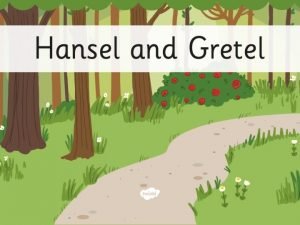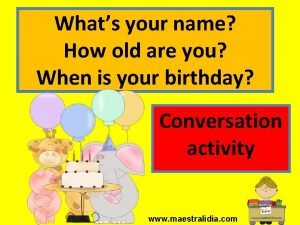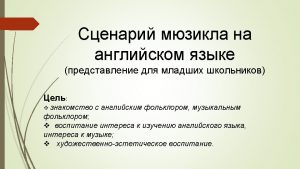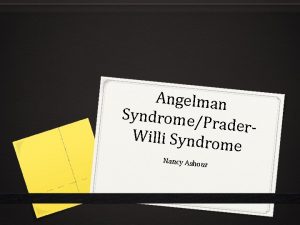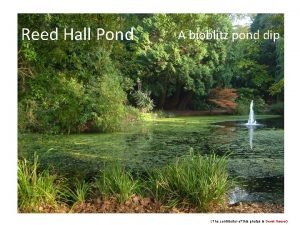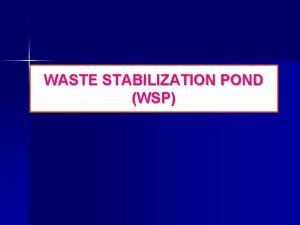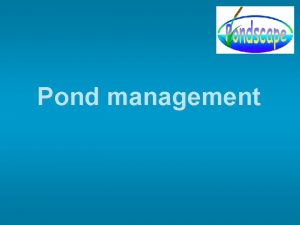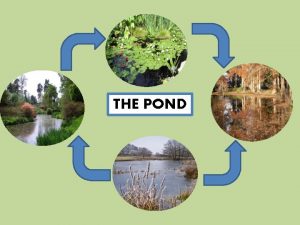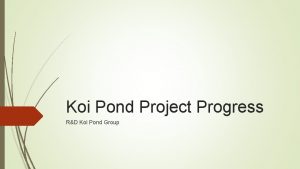atsuo asho aiku ld pond The old pond
















- Slides: 16

Мatsuo Вasho. Нaiku «Оld pond» The old pond a frog jumps in, sound of water. . . Translated by Robert Hass

Askhat Alimov (Kazakhstan) Lesson Study groups as an effective form of teacher development

4 I would like to read to you a khayku written by XVII century Japanese writer Matsuo Basһо. . . 4 It is appropriate for each student to use different lessons in each country, at each school, and in Lesson Study, as this verse generates different feelings and images. We also adapt the Lesson Study in Kazakhstan in line with our own peculiarities, capabilities, and experience. 4 Secondary education reform is being implemented in Kazakhstan. The goal is to make the secondary education system of the country meet the modern requirements based on common human values and to move to a 12 -year education system. In this context, the teachers of the country are being trained in an updated program. Similarly, heads of about 7, 100 schools in the country attend 9 -month courses and improve their knowledge. I teach these courses as a trainer. In particular, since September 2013, I have held 10 courses of school principals, where I trained 271 directors and supervisors.

4 One of the key management ideas in these courses is to support the directors' professional development of their teachers in their schools at regular, systematic, and realistic levels. School teachers use Lesson Study in their own schools after graduating, and school principals also master this method in their own courses. One of the most important questions is, "How coherent is their work in this direction? "

4 That is why I chose this report as an answer to the question: "How can the Directors manage and support the work of Lesson Study teams at schools? " How can this be evaluated? In my opinion, it is important to note how creative the teacher here is in understanding the Lesson Study. Whether or not there is a creativity in the teacher's answers to the question "Does the Directors work with the template, manage the school, or give them the opportunity to use Lesson Study? " In my research, I have tried to answer the question: "How do school directors reach the creativity of teachers, how much patience, patience and patience they have? "

4. The study found that school principals had the following basic understanding of Lesson Study: 4 - jointly planning lessons (53, 8%) to solve some of the most urgent problems (theoretical, methodological or problem-specific problem) 4 - Monitoring students' learning attitudes during classes, identifying their achievements and difficulties (61, 5%), 4 - Identify their needs, requests and suggestions through interview with students (including lessons), lessons learned (73. 4%),

4 - Postpartum students will be able to use the results of the monitoring and interview, to make positive changes in the classroom, improve the lesson plans, share their colleagues (67. 6%), 4 - The reflection of their work in Lesson Study will continue in the following areas: "Identification of the subject matter - Theoretical issues and coordination of problem solving - Co-planning Participation in classes - Lesson Study Improving Lesson Plans" (51, 5%).

4 From this data, we see that school principals have a basic understanding of Lesson Study's ideas. In their essays, he continued his ideas with the following ideas: "I have decided that I will start my work based on Lesson Study groups", "I believe that in Lesson Study groups, teachers will form self-control and develop their own self-development environment", "LS groups are continual, will become a key component of a self-regulated, self-sustaining school. "" If possible, it would be desirable to involve all teachers in the work of these groups ".

4 After the first theoretical period, school leaders went on to the first 4 -week practice with such "right" ideas. After the internship, they shared their thoughts and shared how to implement Lesson Study. I saw some of their positions, and some of them changed.

4 First of all, together with the directors, I first noticed that using Lesson Study in schools, I tried to "reconfigure" their actions in this direction: 4 I. Up to the lesson. 4 1) Creation of LS groups. 4 2) Choosing one of the most urgent issues (research topic) in everyday practice. Determination of its purpose and expected results. 4 3) Coaching (training) within the selected problem range, theoretical content of the problem, choice of possible solutions. 4 4) Joint class planning. 4 5) Selection of supervised pupils and small groups, tools used in the process of control and interviews. 4 6) Interviewing students from the classroom (this step is optional, and the teacher decides on it). 4 7) Changes to the lesson plan based on the interviews with pupils (this step has not been used unless the student has interviewed the lesson).

4 II. During lessons. 4 1) Lesson Study lesson. 4 a) control how learners are trained, how the chosen methods are implemented, and how to define their achievements and difficulties in learning. 4 III. After the lesson. 4 1) Getting an interview after school hours. 4 2) Discuss the lesson from the point of view of the solution of the problem being studied, changes in the lesson plan ("the best lesson plan - the syllabus plan"), the improved version of the lesson plans, and sharing with colleagues from other groups (schools). 4 This is the basic action taken, Lesson Study scheme, draft, template.

4 However, each school has introduced many changes to the Lesson Study and group work. Second, I'll talk about them. These include the following: 4 - teachers are united by LS groups on their own initiative (not in the subject matter or in this classroom only) 4 - LS groups do not have more than 3 -6 teachers, 4 - Teachers who do not want to join LS groups are not enforced; 4 - LS groups have studied theoretical issues of the problem that arose, the ways and methods of its solution were determined by the beginning of the set of lessons,

4 - The results of LS groups are predetermined, 4 - Coaching organized by coaching teachers before joint planning, 4 - Summarizing the results of the LS group work was carried out through compact sessions, 4 - The work of the LS teams was conducted in collaboration with other schools. 4 Students are involved in classroom planning so they are an active participant in the educational process. 4 - Students were interviewed before class. 4 - At the school an expert team of experienced teachers gave feedback on the work of each LS group. 4 Here, I did not bring all the results, but just mentioned the most important.

4 Thirdly, the process of organizing LS teams in schools has led to the following questions: 4 - Why are experienced teachers unwilling to participate in LS teams? 4 - What are the reasons why teachers choose the subject of research in the LS groups, and what is the reason for their deviation? 4 - How can the LS groups help teachers to read books on professional topics? 4 - How can you encourage teachers to co-operate independently? 4 - What are the effective tools for taking the voice of students in the LS groups? 4 - How to design student tools in LS groups?

4 I plan to give answers to these questions in the next study. In addition, today I monitor how the following issues have been implemented: 41. Problem research involves the teaching of teachers with scientific and methodological literature. 42. Consideration of problems before co-planning by coaching. 43. Communicate with the students in the classroom. 4 And I think that these problems will be addressed in my next study.

 Nursery pond is seasonal
Nursery pond is seasonal Haiku exaple
Haiku exaple Once upon a time there lived
Once upon a time there lived What's your name how old are you
What's your name how old are you Once upon a time, there lived
Once upon a time, there lived Once upon a time there lived an old man and an old woman
Once upon a time there lived an old man and an old woman Thiếu nhi thế giới liên hoan
Thiếu nhi thế giới liên hoan Alleluia hat len nguoi oi
Alleluia hat len nguoi oi điện thế nghỉ
điện thế nghỉ Một số thể thơ truyền thống
Một số thể thơ truyền thống Trời xanh đây là của chúng ta thể thơ
Trời xanh đây là của chúng ta thể thơ Số.nguyên tố
Số.nguyên tố Fecboak
Fecboak đặc điểm cơ thể của người tối cổ
đặc điểm cơ thể của người tối cổ Tỉ lệ cơ thể trẻ em
Tỉ lệ cơ thể trẻ em Các châu lục và đại dương trên thế giới
Các châu lục và đại dương trên thế giới ưu thế lai là gì
ưu thế lai là gì


